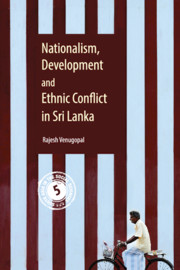Book contents
- Frontmatter
- Dedication
- Contents
- Figures
- Tables
- Preface
- 1 Nationalism, Development and Ethnic Conflict in Sri Lanka
- 2 Sinhala Nationalism
- 3 Kulaks to Clerks
- 4 The Politics of Market Reform at a Time of Ethnic Conflict
- 5 Military Fiscalism
- 6 The ‘Best and Last’ Chance for Peace
- 7 Cosmopolitan Capitalism
- 8 Sectarian Socialism
- 9 Conclusions: Elites, Masses and the Rajapaksa Presidency
- Bibliography
- Index
2 - Sinhala Nationalism
Published online by Cambridge University Press: 01 November 2018
- Frontmatter
- Dedication
- Contents
- Figures
- Tables
- Preface
- 1 Nationalism, Development and Ethnic Conflict in Sri Lanka
- 2 Sinhala Nationalism
- 3 Kulaks to Clerks
- 4 The Politics of Market Reform at a Time of Ethnic Conflict
- 5 Military Fiscalism
- 6 The ‘Best and Last’ Chance for Peace
- 7 Cosmopolitan Capitalism
- 8 Sectarian Socialism
- 9 Conclusions: Elites, Masses and the Rajapaksa Presidency
- Bibliography
- Index
Summary
Sinhala nationalism is the dominant form of political consciousness in contemporary Sri Lanka. As what might easily be characterised as an illiberal ‘ethnic’ nationalism of the east rather than the western ‘civic’ ideal, it is also widely identified as a serious challenge to the functioning of liberal democratic institutions, and to multi-ethnic coexistence. Sinhala nationalism features as a central element in the literature on contemporary Sri Lankan politics, and in particular, on the ethnic conflict. Understanding Sinhala nationalism is thus of critical significance, and this imperative has inspired an extensive and sophisticated literature.
This includes the historicity of Sinhala identity (Gunawardena 1985, Dharmadasa 1992, Roberts 2004), the Buddhist revival and colonialism (Malalgoda 1976, Bond 1992, Tambiah 1992, Blackburn 2010, Rogers 1994), the Mahavamsa (Kemper 1991), colonial forms of knowledge (Rogers 2004, Kemper 1991), the State Council, Olcott and Dharmapala (Seneviratne 1999, Amunugama 1985, Roberts 1997, Kemper 2015), archaeology, the rediscovery of Anuradhapura and the Sinhala Buddhist past (Nissan 1989, Kemper 1991, Jeganathan 1995, De Silva 2013), the evolution of ‘protestant’ and post-protestant Buddhism (Obeyesekere 1970, Gombrich and Obeyesekere 1988), the changing role of monks (Seneviratne 1999, Kemper 1980, Bartholomeusz 2005, Kent 2015), temperance, the 1915 riots, language and literature (Coperahewa 2012, Rambukwella 2012, Field 2014), the transformation of village society, politics, and religious practices (Spencer 1990, Brow 1997, Woost 1994), the discourse of peasant preservation, and development projects (Brow 1997, Tennekoon 1988), the nationalist upsurge of 1956 (Kearney 1967), and the constitution (Schonthal 2016, Wijeyeratne 2013).
But despite the large amount of historical and anthropological literature, there is surprisingly little research available on the actual insinuation and operation of nationalism in the contemporary political sphere. Sinhala nationalism is widely deployed as an independent variable to explain political outcomes and as an explanatory prop. It is often thought of as a bubbling cauldron, a dormant evil genie, or some base instinct in the masses that is awakened by irresponsible politicians. But being seen as a self-evident evil in this way, nationalism itself is under-explained and its political operation is obscured.
Succinct, abstract definitions of nationalism are often found wanting and inadequate, in part, because the task is complex: it involves creating a generalisable, universally applicable, comparable category out of something inherently very particular.
- Type
- Chapter
- Information
- Publisher: Cambridge University PressPrint publication year: 2018



